2017人教版九年级英语知识点总结
人教版九年级英语知识点总结
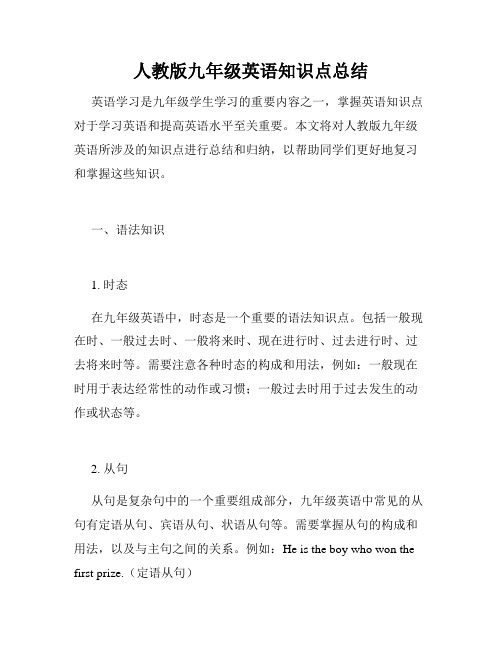
人教版九年级英语知识点总结英语学习是九年级学生学习的重要内容之一,掌握英语知识点对于学习英语和提高英语水平至关重要。
本文将对人教版九年级英语所涉及的知识点进行总结和归纳,以帮助同学们更好地复习和掌握这些知识。
一、语法知识1. 时态在九年级英语中,时态是一个重要的语法知识点。
包括一般现在时、一般过去时、一般将来时、现在进行时、过去进行时、过去将来时等。
需要注意各种时态的构成和用法,例如:一般现在时用于表达经常性的动作或习惯;一般过去时用于过去发生的动作或状态等。
2. 从句从句是复杂句中的一个重要组成部分,九年级英语中常见的从句有定语从句、宾语从句、状语从句等。
需要掌握从句的构成和用法,以及与主句之间的关系。
例如:He is the boy who won the first prize.(定语从句)3. 名词性从句名词性从句在九年级英语中也是常见的一个知识点,包括主语从句、宾语从句、表语从句和同位语从句等。
学生要注意名词性从句的引导词和用法,以及从句在句子中的语法作用。
4. 被动语态被动语态是九年级英语中常见的语法知识点之一。
学生需要了解被动语态的构成和用法,能够准确地将主动句变为被动句,并掌握被动句与主动句的语义和语法对应关系。
5. 几种特殊句型除了上述基础的语法知识点外,九年级英语还涉及到一些特殊的句型,如虚拟语气、倒装句、直接引语和间接引语等。
学生要能够理解和运用这些特殊句型,提高自己的语言表达能力。
二、词汇和短语1. 词义辨析在九年级英语中,学生需要理解和辨析一些相近的词义,如特殊动词、形容词和名词的用法差异。
例如:Wish和hope的区别;Big和large的区别等。
学生可以通过大量的阅读和实践来掌握这些词汇的用法。
2. 习惯用语和固定搭配九年级英语中还会遇到很多常用的习惯用语和固定搭配,学生需要掌握这些表达方式,以便提高自己的口语和写作能力。
例如:be interested in、look forward to、take care of等。
-2017学年新目标人教版初中英语九年级英语unit13知识归纳与
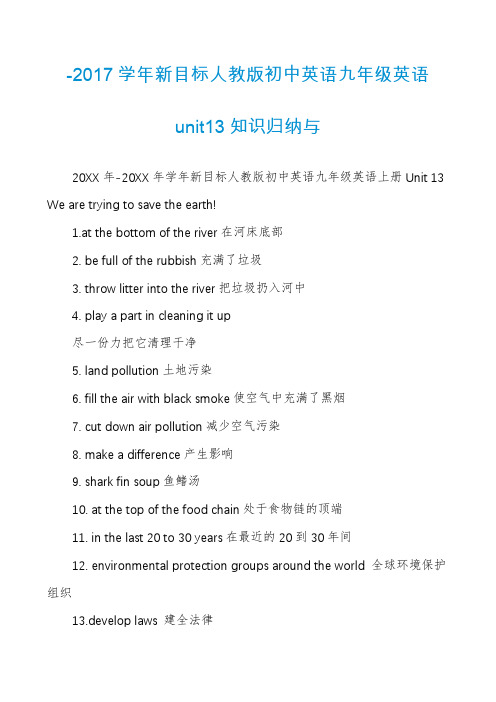
-2017学年新目标人教版初中英语九年级英语unit13知识归纳与20XX年-20XX年学年新目标人教版初中英语九年级英语上册Unit 13 We are trying to save the earth!1.at the bottom of the river在河床底部2. be full of the rubbish充满了垃圾3. throw litter into the river把垃圾扔入河中4. play a part in cleaning it up尽一份力把它清理干净5. land pollution土地污染6. fill the air with black smoke使空气中充满了黑烟7. cut down air pollution减少空气污染8. make a difference产生影响9. shark fin soup鱼鳍汤10. at the top of the food chain处于食物链的顶端11. in the last 20 to 30 years在最近的20到30年间12. environmental protection groups around the world 全球环境保护组织13.develop laws 建全法律14.the sale of shark fins 鱼鳍买卖15. take part in 参加16. can?t afford to do sth 负担不起做某事17. take action 采取行动18. turn off 关掉19. pay for付费20. add up累加X k B 1 . c o m21. use public transportation 使用公共交通22. recycle books and paper 回收书和废纸23. use paper napkins 使用纸巾24. turn off the shower 关掉喷头25. ride in cars 开车出行26. throw away 扔掉27. put sth to good use 好好利用28. pull…down拆下29. an old boat turned upside down一艘倒过来的旧船30. be an inspiration to sb 成为…的榜样31. set up a website 建立一个网站32. a “metal art” theme park 一个“金属艺术”主题公园33. be known for 以…而闻名34. not only…but also…不仅…而且…二近义词辨析1.与“花费”有关,但用法上有区别。
【人教版】2017学年度九年级新目标英语:Unit 7 知识点总结
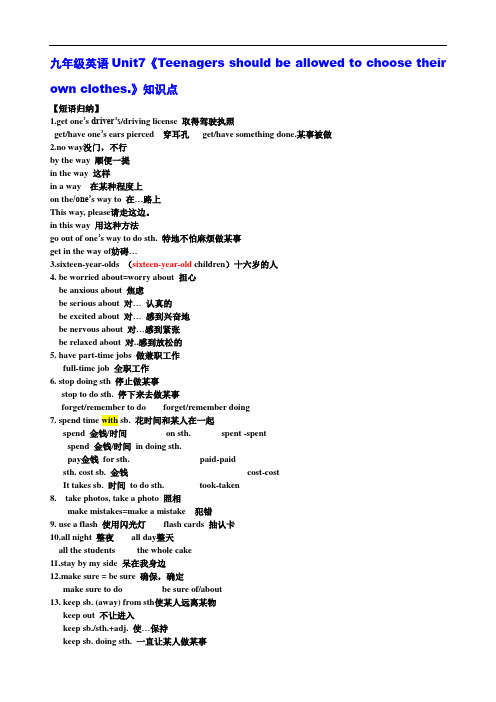
九年级英语Unit7《Teenagers should be allowed to choose their own clothes.》知识点【短语归纳】1.get one’s driver’s/driving license 取得驾驶执照get/have one’s ears pierced 穿耳孔get/have something done.某事被做2.no way没门,不行by the way 顺便一提in the way 这样in a way 在某种程度上on the/one’s way to 在…路上This way, please请走这边。
in this way 用这种方法go out of one’s way to do sth. 特地不怕麻烦做某事get in the way of妨碍…3.sixteen-year-olds (sixteen-year-old children)十六岁的人4. be worried about=worry about 担心be anxious about 焦虑be serious about 对…认真的be excited about 对…感到兴奋地be nervous about 对…感到紧张be relaxed about 对..感到放松的5. have part-time jobs 做兼职工作full-time job 全职工作6. stop doing sth 停止做某事stop to do sth. 停下来去做某事forget/remember to do forget/remember doing7. spend time with sb. 花时间和某人在一起spend 金钱/时间on sth. spent -spentspend 金钱/时间in doing sth.pay金钱for sth. paid-paidsth. cost sb. 金钱cost-costIt takes sb. 时间to do sth. took-taken8. take photos, take a photo 照相make mistakes=make a mistake 犯错9. use a flash 使用闪光灯flash cards 抽认卡10.all night 整夜all day整天all the students the whole cake11.stay by my side 呆在我身边12.make sure = be sure 确保,确定make sure to do be sure of/about13. keep sb. (away) from sth使某人远离某物keep out 不让进入keep sb./sth.+adj. 使…保持keep sb. doing sth. 一直让某人做某事keep/stop/prevent sb. from doing 阻止某人做某事14. hurt oneself 伤害某人自己15. give sb. a hug = hug sb. 拥抱某人n. v.16. lift sb. up 举起某人lift 电梯v. n.17. cough badly 剧烈地咳嗽have a high fever发高烧18. talk back 回嘴19. an adult 一个成人kid-kids child-children20. think back to 回想起look back talk back come back go back get back回头看顶嘴回来回去回来turn back give back bring back take back转身归还带回来带回去21. regret doing sth. 后悔做了某事22. ma ke one’s own decision 做某人自己的决定decide to do sth. = make a decision to do = make up one’s mind to do sth.下定决心做某事23.too + adj.+ to do sth. 太…而不能做某事not… enough toso… that = such… that 如此…以至于The boy is too young to dress himself.The boy is not old enough to dress himself.The boy is so young that he can’t dress himself.He is such a young boy that he can’t dress himself.24. learn…from…从…学到…25. agree with sb 同意某人的观点agree to do sth.disagree with sb. 不同意某人的观点disagree to do sth.agreement--- disagreement n.be in agreement 意见一致26.move out 搬出去27.take (good)care of = look after(well)=care for 照顾28.manage one’s own life 管理自己的生活manage to do sth 努力完成某事try to do sth. 努力做某事try one’s best to do 尽某人最大努力做某事29. that is why 那就是为什么…30. continue to do sth 继续做某事31. take a test参加考试pass the test通过考试fail the test考试不及格fail to do sth.succeed in doingsuccess n. succeed v. successful adj. successfully adv.32. be strict with sb. in sth.在某方面对某人要求严格33. a running star一个跑步明星34. a professional runner一个专业的跑步运动员35. grow up长大grow-grew-grownget/be older36. allow sb. to do sth.允许某人做某事be allowed to do sth. 被允许做……allow doing sth. 允许做……should be allowed to do sth. 应该被允许去做某事37.have nothing against doing sth.We have nothing against running.38.end up with 以…结束end up as 最终成为at the end of-----at the beginning ofin the end=at last=finallyby the end of …39.practice doing sth.练习做某事practice/finish/enjoy/mind/suggest/avoid/consider/stand/allowpay attention to, look forward to, concentrate on, give up, put off…注意盼望,向往集中注意力放弃推迟40.see sb. do sth. 看见某人做了某事see sb doing sth. 看见某人正在做某事hear/see/watch/notice sb. do sth. 变被动还原tohear/see/watch/notice sb. doing sthlet/make/have sb. do sth. 变被动还原to41. care about sb.关心某人42. talk with sb. about sth.和某人谈论某事talk back, have a talk, give a talk, talk show, talk to…顶嘴谈谈作报告脱口秀和..谈43. make a choice做选择choose-chose-chosen44. have a chance to do sth.= have an opportunity to do sth.have a chance of doing sth.= have an opportunity of doing sth.有机会去做某事45. on/at weekends = on/at the weekend在周末46. at that age 在那个年龄段in one’s twenties 在某人20多岁的时候47. on school nights 在上学期间的每个晚上on school days48. stay up (sleep late)熬夜oversleep (get up late)49. clean up (相当与及物动词)清扫Clean-up Day扫除日50. the other day=a few days ago 前几天51. all my classmates 我所有的同学52. concentrate on doing全神贯注于53. be good for 对…有益be bad for对..有害be good/kind/friendly to对.. 友好的be good at=do well in擅长于..be good with 善于应对的54. in groups 成群的,按组55. get/be noisy 吵闹(系表结构)make a noise 吵闹noise-noisy-noisily56. at present 目前,现在【重点句子】57. I don’t think twelve-year-olds should be allowed to get their ears pierced. 我认为不应该允许12岁的孩子穿耳孔。
(完整版)2017新目标人教版九年级英语全册重点短语和句型总结
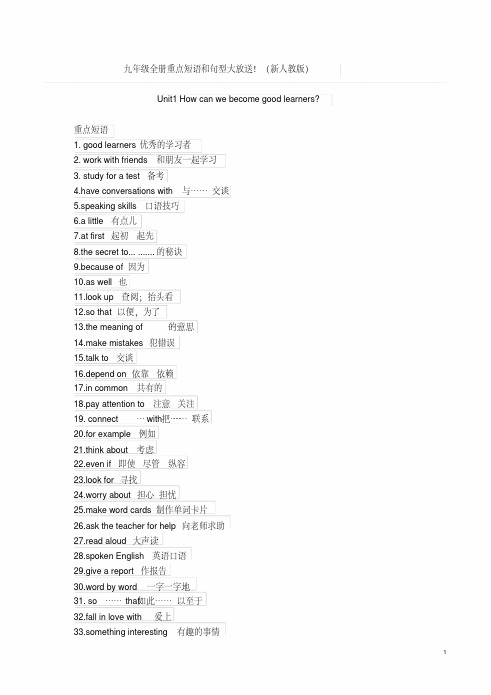
九年级全册重点短语和句型大放送!(新人教版)Unit1 How can we become good learners?重点短语1. good learners 优秀的学习者2. work with friends 和朋友一起学习3. study for a test 备考4.have conversations with 与……交谈5.speaking skills 口语技巧6.a little 有点儿7.at first 起初起先8.the secret to... .......的秘诀9.because of 因为10.as well 也11.look up 查阅;抬头看12.so that 以便,为了13.the meaning of ……的意思14.make mistakes 犯错误15.talk to 交谈16.depend on 依靠依赖17.in common 共有的18.pay attention to 注意关注把……联系19. connect …with …20.for example 例如21.think about 考虑22.even if 即使尽管纵容23.look for 寻找24.worry about 担心担忧25.make word cards 制作单词卡片26.ask the teacher for help 向老师求助27.read aloud 大声读28.spoken English 英语口语29.give a report 作报告30.word by word 一字一字地31. so……that 如此……以至于32.fall in love with 爱上33.something interesting 有趣的事情1。
2016-2017学年度九年级英语Unit 13 知识点总结(新目标人教版)

2016-2017学年度九年级英语Unit 13 知识点总结(新目标人教版)九年级英语Unit13《e’re tring t save the earth!》知识点1现在进行时定义:表示说话时(瞬间)正在进行的动作,也表示目前或现阶段一直进行的动作。
结构: ①肯定句: 主语+ a/is/are + V-ing②否定句: 主语+ a/is/are + nt + V-ing③疑问句: A/Is/Are + 主语+ V-ing用法:1)表示说话时正在进行的,目前正在发生的动作。
①L! The big bird is fling aa ②He is athing a vie n2)表示目前一段时间内正在进行,但说话时可能没有进行的动作。
Right n I a studing hinese b distane learning 我现在正通过远程教育学习汉语。
1) 2)常带有表示目前时刻的时间副词, 如:n, right n, at the (ver) ent, fr the tie being, at present, these das 及L! Listen!3)与alas, nstantl, frever, all the tie等副词连用,表示动作反复或习惯。
此时句子常含有说话者的强烈情感在内。
表达较强的“责备”或“表扬”之意①u are alas hanging ur ind 你总是主意不定。
(太烦人了)②He is alas helping thers他总是帮助别人。
(他真是个好人)4)对于e, g, leave, arrive, start, fl, drive等表示位置移动的动词常可用进行时态表将。
①He is leaving n ednesda②ar isn’t here at the ent She is ing later2 used t d过去常常做某事见第四单元及use用法be/get used t ding 习惯于做某事be used t d=be used fr ding 被用做某事3 被动语态见第五单元注意:接双宾语的词的被动语态;ae /let /have sb d的被动语态;see/ hear /ntie /find /bserve/ntie sb d 的被动语态;It’s said/reprted/believed/suppsed/ell-nn that;及无被动语态的三种情况(感官动词、不及物动词、sell/rite等)4 现在完成时:用法:①过去发生的动作对现在造成的影响或结果:强调结果esterda I finished her, that’s t sa, I have finished her n②过去已经开始一直持续到现在的动作或状态:强调继续I have lived here sine 1990现在完成时的构成have/has+过去分词现在完成时的四个基本句型肯定句He has finished the r一般疑问句Has he finished the r?否定句He has nt finished the r两回答es ,he has N, he hasn’t特殊疑问句hat has he dne?在下列情形下用现在完成时1九词语①alread 已经肯定句中或句尾I have alread fund pen = I have fund pen alread②et已经否定句和疑问句句尾I have nt finished the r etHave u bught a puter et?③ever曾经句中Have u ever seen pandas?④never从不句中I have never been t Beiing⑤ust刚刚句中I have ust dne r⑥befre以前句尾I have never been there befre⑦s far到目前为止S far he has learned 200 rds⑧h lng多久H lng have u lived here?⑨h an ties多少次H an ties has he been t Beiing?2两词组have<has>gne t去了某地例:He has gne t Beiing (去了北京,没回)have<has>been t去过某地例:He has been t Beiing (去过北京,回了)3两结构fr t nths fr +一段时间i has lived here fr 2 nthssine last earsine +过去时间点Lu has been in Beiing sine 3 ears agsine 3 ears agsine 1990sine he ae heresine +过去时态句子He has been in hina sine he ae here4如果句子里面没有时间状语,汉语意思能够加“已经”,往往用现在完成时态。
人教版九年级英语全册重点单词+短语+句型知识讲解
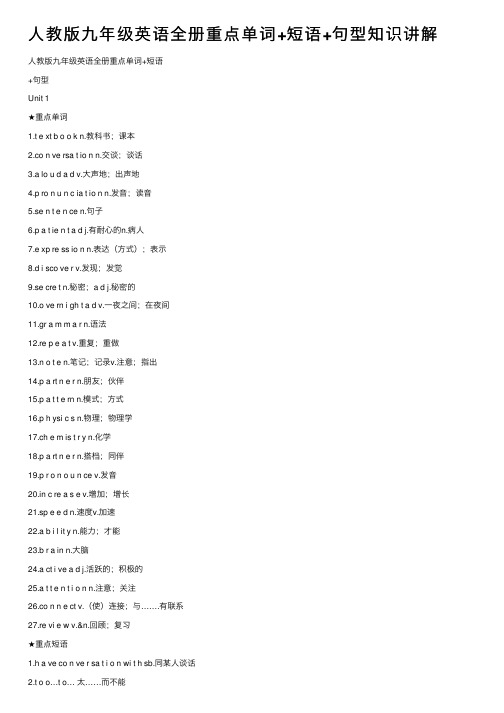
⼈教版九年级英语全册重点单词+短语+句型知识讲解⼈教版九年级英语全册重点单词+短语+句型Unit 1★重点单词1.t e xt b o o k n.教科书;课本2.co n ve rsa t io n n.交谈;谈话3.a lo u d a d v.⼤声地;出声地4.p ro n u n c ia t io n n.发⾳;读⾳5.se n t e n ce n.句⼦6.p a t ie n t a d j.有耐⼼的n.病⼈7.e xp re ss io n n.表达(⽅式);表⽰8.d i sco ve r v.发现;发觉9.se cre t n.秘密;a d j.秘密的10.o ve rn i gh t a d v.⼀夜之间;在夜间11.gr a m m a r n.语法12.re p e a t v.重复;重做13.n o t e n.笔记;记录v.注意;指出14.p a rt n e r n.朋友;伙伴15.p a t t e rn n.模式;⽅式16.p h ysi c s n.物理;物理学17.ch e m is t r y n.化学18.p a rt n e r n.搭档;同伴19.p r o n o u n ce v.发⾳20.in c re a s e v.增加;增长21.sp e e d n.速度v.加速22.a b i l it y n.能⼒;才能23.b r a in n.⼤脑24.a ct i ve a d j.活跃的;积极的25.a t t e n t i o n n.注意;关注26.co n n e ct v.(使)连接;与…….有联系27.re vi e w v.&n.回顾;复习★重点短语1.h a ve co n ve r sa t i o n wi t h sb.同某⼈谈话2.t o o…t o… 太……⽽不能3.t h e se cr e t t o… ……的秘诀4.b e a f r a id o f d o in g st h./b e a f ra id t od o st h.害怕做某事5.l o o k u p查阅6.r e p e a t o u t lo u d⼤声跟读7.m a ke m i st a k e s i n在……⽅⾯犯错误8.co n n e ct……wi t h… 把……和……连接/联系起来9.ge t b o re d感到厌烦10.b e st re sse d o u t焦虑不安的11.p a y a t t e n t io n t o注意;关注12.d e p e n d o n取决于;依靠13.t h e a b il it y t o d o st h..做某事的能⼒★重点句型1.提建议的句⼦:①W h a t/h o w a b o u t+d o in g st h?做……怎么样?如:W h a t/H o w a b o u t go in g sh o p p in g?②W h y d o n't yo u+d o st h?你为什么不做……?如:W h y d o n't yo u g o sh o p p in g?③W h y n o t+d o st h?为什么不做……?如:W h y n o t go sh o p p in g?④L e t's+d o st h.让我们做……吧。
(完整word版)人教版九年级英语(全一册)知识点汇总,文档

九年级英语 Unit1 ? How can we become good learners??知识点【短语归纳】1. have conversation with sb. 同某人发言2. too to 太而不能够3. the secret to的诀要4. be afraid of doing sth./ be afraid to do sth.害怕做某事5. look up 查阅6. repeat out loud 大声跟读7. make mistakes in在⋯⋯方面犯 8. connect ⋯⋯with ⋯把⋯⋯和⋯⋯接 /系起来9. get bored 感觉厌烦10. be stressed out 忧愁不安的11. pay attention to 注意;关注12. depend on 取决于;依赖13. the ability to do sth..做某事的能力 14. first of all 第一15 take notes 做笔录,做记录16. enjoy doing sth .16. native speaker 说本族语的人17. make up 组成、组成18. be angry with sb. 对某人生气19.each other 互相20.too many :好多,修饰可数名词too many girlstoo much :好多,修饰不能数名词too much milk 〔too many和 too much〕much too :太,修饰形容词much too beautiful21.change into将变成22. with the help of sb. == with one's help在某人的帮助下with the help of LiLei == with LiLei's help在李雷的帮助下pare to 把: 与对照〔 compare with 拿和比较〕【单元知识点】1.by + doing :经过方式2.talk about 议论,讨论,讨论The students often talk about movie after class.学生们经常在课后讨论电影。
2017新人教版九年级英语全册知识点归纳

2021新人教版九年级英语全册知识点归纳1 ?短语总结:1. 优秀的学习者2. 和朋友一起学习3. a 备考4 与……交谈5 口语技巧6 有点儿7 起初起先8 ......, .......的秘诀9 因为10 也11 (在词典中等)查阅;抬头看12 以便,为了13 ……的意思14 犯错误15 交谈16 依靠依赖17 共有的18 注意关注19 …… ……把……联系20 例如21 考虑22 即使尽管纵容23 寻找24 担忧担忧25 制作单词卡片26 向教师求助27 大声读28 英语口语29 a 作报告30 一字一字地31…… 如此……以至于32 爱上33 有趣的事情34 记笔记35 多久一次36 许多37 . 做某事的能力38 学习习惯39 对……感兴趣40 感到无聊41 在……方面擅长42 害怕43 彼此互相44 代替而不是二.用法集萃1. 通过做某事2 做某事是……的3 完成某事4 ?做某事怎么样?5 尽力做某事6 +比拟近,比拟近越……,就越……7 发现做某事8 害怕做某事9 () 帮助某人做某事10 练习做某事11 一直做某事12 害怕做某事13 开场做某事14 想要做某事15 需要做某事16 记得做某事17 射〔射着,射死等表结果〕18 〔瞄准〕射书面表达〔一〕假设你是张晓华,下面是你的笔友李军给你写的一封电子邮件。
请给他写封回信,帮助他解决一下问题。
要求: 1. 注意书信的格式。
2. 针对问题提出合理的建议。
3. 80词左右。
,I’m . I . I . , I’m . ’s , I . I’m . I , I ’t . I ? . ., ,I’m . I. . . ’sa . ’t . . . , I .!,2 I !一.短语归纳1 增加〔体重〕发胖2 关心 在乎3 最终成为, 最后处于4 …… ……不但……而且……5 射下6 过去常常做……7 . 使某人想起8 分发 发放9 泼水节 10 中国春节 11 明年 12 听起来像 13 互相 彼此 14 以……的形状 15 在中秋之夜 16 飞向 17 摆开 布置 18 回来 19 a 结果 因此 20’s 母亲节 21 越来越受欢送 22 想起 认为 思考23 装扮穿上盛装24 ……的重要性25 挣钱26 需要帮助处于困境中27 ………… 在……和……之间28 龙舟节29 元宵节30 最喜欢31 …… a 去……度假32 与……相似33 冲走洗掉34 中秋节35 射下36 大声呼喊37 ……的传统38 在夜里在晚上39……,……一个……,另一个… 40’s 父亲节41 必须不得不42 a 捉弄某人43 ……的精神44 关心45 醒来46 ……的开场二.用法集萃1.感慨句式一:〔〕名词〔+主语+谓语+其他〕!多么……的……感慨句式二:主语+谓语+其他!……多么……!2时间段在……后3 . . 给某人某物4 方案做某事5 拒绝做某事6 +名词复数形式……之一7 名词+动词不定式〔〕做某事是…8 … …?认为…怎么样?9 让某人做某事10 过去是……11 〔〕告诫某人做某事12 〔〕告诉某人做某事13 决定做某事14 承诺、容许做某事三.语法全解1.宾语从句一.连词可跟从句做宾语的动词:, , , , , , , , , , , , , , , , , , , , , , , , , , , , , 等例:I ’t .?注意:当主句谓语动词是 , , , 等词,而宾语从句的意思是否认时,常把否认转移至主句表示。
2017人教版九年级英语2单元重点短语句型语法及书面表达
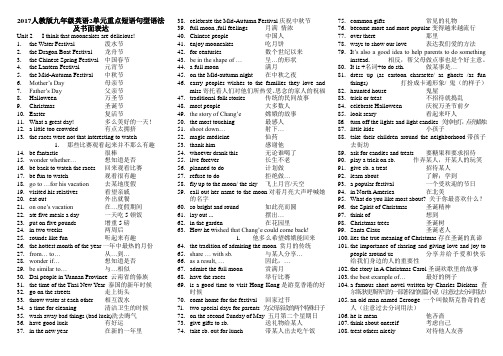
2017人教版九年级英语2单元重点短语句型语法及书面表达Unit 2 I think that mooncakes are delicious!1.the Water Festival 泼水节2.the Dragon Boat Festival 龙舟节3.the Chinese Spring Festival 中国春节4.the Lantern Festival 元宵节5.the Mid-Autumn Festival 中秋节6.Mother’s Day 母亲节7.Father’s Day 父亲节8.Halloween 万圣节9.Christmas 圣诞节10.Easter 复活节11.What a great day! 多么美好的一天!12. a little too crowded 有点太拥挤13.the races were not that interesting to watch1.那些比赛观看起来并不那么有趣14.be fantastic 很棒15.wonder whether…想知道是否16.be back to watch the races 回来观看比赛17.be fun to watch 观看很有趣18.go to …for his vacation去某地度假19.visited his relatives 看望亲戚20.eat out 外出就餐21.on one’s vacation 在…度假期间22.ate five meals a day 一天吃5顿饭23.put on five pounds 增重5磅24.in two weeks 两周后25.sounds like fun 听起来有趣26.the hottest month of the year一年中最热的月份27.from… to…从…到…28.wonder if…想知道是否29.be similar to…与…相似30.Dai people in Y unnan Province 云南省的傣族31.the time of the Thai New Year 泰国的新年时候32.go on the streets 走上街头33.throw water at each other 相互泼水34. a time for cleaning 清洁卫生的时候35.wash away bad things (bad luck)洗去晦气36.have good luck 有好运37.in the new year 在新的一年里38.celebrate the Mid-Autumn Festival庆祝中秋节39.full moon ,full feelings 月满情浓40.Chinese people 中国人41.enjoy mooncakes 吃月饼42.for centuries 数个世纪以来43.be in the shape of …呈…的形状44. a full moon 满月45.on the Mid-autumn night 在中秋之夜46.carry peoples wishes to the families they love andmiss寄托着人们对他们所热爱、思念的家人的祝福47.traditional folk stories 传统的民间故事48.most people 大多数人49.the story of Chang’e嫦娥的故事50.the most touching 最感人51.shoot down…射下…52.magic medicine 仙药53.thank him 感谢他54.whoever drank this 无论谁喝了55.live forever 长生不老56.planned to do 计划做57.refuse to do 拒绝做…58.fly up to the moon/ the sky 飞上月宫/天空59.call out her name to the moon对着月亮大声呼喊她的名字60.so bright and round 如此亮而圆y out ... 摆出…62.in the garden 在花园里63.How he w ished that Chang’e could come back!i.他多么希望嫦娥能回来64.the tradition of admiring the moon 赏月的传统65.share … with sb. 与某人分享…66.as a result, … 因此,…67.admire the full moon 赏满月68.have the races 举行比赛69.is a good time to visit Hong Kong是游览香港的好时候e home for the festival 回家过节71.two special days for parents 为父母亲设的两个特殊日子72.on the second Sunday of May 五月第二个星期日73.give gifts to sb. 送礼物给某人74.take sb. out for lunch 带某人出去吃午饭mon gifts 常见的礼物76.become more and more popular变得越来越流行77.over there 那里78.ways to show our love 表达我们爱的方法79.I t’s also a good idea to help parents to do somethinginstead. 相反,帮父母做点事也是个好主意。
人教版九年级英语全册各单元知识点总结
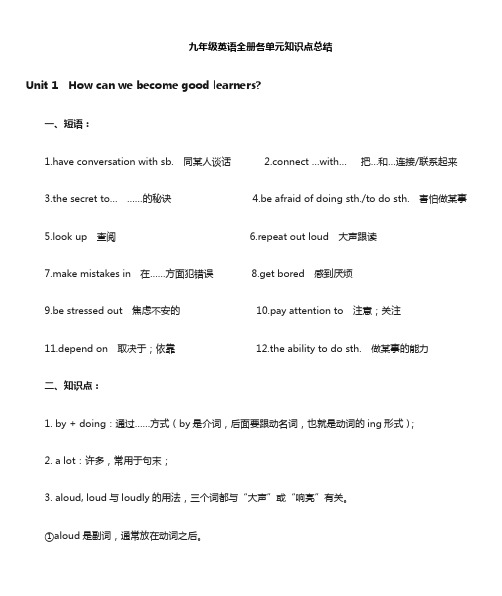
九年级英语全册各单元知识点总结Unit 1 How can we become good learners?一、短语:1.have conversation with sb. 同某人谈话2.connect …with… 把…和…连接/联系起来3.the secret to… ……的秘诀4.be afraid of doing sth./to do sth. 害怕做某事5.look up 查阅6.repeat out loud 大声跟读7.make mistakes in 在……方面犯错误8.get bored 感到厌烦9.be stressed out 焦虑不安的10.pay attention to 注意;关注11.depend on 取决于;依靠12.the ability to do sth. 做某事的能力二、知识点:1. by + doing:通过……方式(by是介词,后面要跟动名词,也就是动词的ing形式);2. a lot:许多,常用于句末;3. aloud, loud与loudly的用法,三个词都与“大声”或“响亮”有关。
①aloud是副词,通常放在动词之后。
②loud可作形容词或副词。
用作副词时,常与speak, talk, laugh等动词连用,多用于比较级,须放在动词之后。
③loudly是副词,与loud同义,有时两者可替换使用,可位于动词之前或之后。
4. not …at all:一点也不,根本不,not经常可以和助动词结合在一起,at all 则放在句尾;5. be / get excited about sth.:对…感到兴奋;6. end up doing sth:终止/结束做某事;end up with sth.:以…结束;7. first of all:首先(这个短语可用在作文中,使得文章有层次);8. make mistakes:犯错make a mistake 犯一个错误;9. laugh at sb.:笑话;取笑(某人)(常见短语)10. take notes:做笔记/记录;11. native speaker 说本国语的人;12. make up:组成、构成;13. deal with:处理、应付;14. perhaps = maybe:也许;15. go by:(时间)过去;16.each other:彼此;17.regard… as … :把…看作为…;18.change… into…:将…变为…;19. with the help of sb. = with one's help 在某人的帮助下(注意介词of和with,容易出题)20. compare … to …:把…比作… compare with 拿…和…作比较;21. instead:代替,用在句末,副词;instead of sth / doing sth:代替,而不是(这个地方考的较多的就是instead of doing sth,也就是说如果of后面跟动词时,要用动名词形式,也就是动词的ing形式)22.Shall we/ I + do sth.? 我们/我…好吗?23. too…to:太…而不能,常用的句型是too+形容词/副词+ to do sth.Unit 2 I think that moon cakes are delicious!一、短语:1. the Lantern Festival 元宵节2. the Dragon Boat Festival 端午节3. the Water Festival 泼水节4. remind sb. of 使某人想起5. eat five meals a day 一天吃五餐6. put on five pounds 体重增加了五磅7. treat sb. with. 用/以……对待某人8. be similar to... 与.......相似9. end up 最终成为/处于10. share sth. with sb. 与……分享……11. as a result结果12. one... the other... (两者中的) 一个…另一个…13. take sb. out for dinner 带某人出去吃饭14. dress up 乔装打扮15. haunted house 鬼屋16. the beginning of new life 新生命的开始二、知识点:1.宾语从句:(三大考点:引导词、时态和语序。
2016-2017学年度九年级英语Unit 6 知识点总结(人教版新目标)

2016-2017学年度九年级英语Unit 6 知识点总结(人教版新目标)Unit6《hen as it invented ?》知识点1 invent v 发明inventr n 发明家inventin n 发明,可数名词The inventr has invented an inventins in the past fe ears2 be used fr ding=be used t d ,用做…(是被动语态)(这个短语的考点有两点,一是used fr的意思,二是fr后面用动名词)Pens are used fr riting 笔是用写的。
used t d 过去常常做某事be/get used t ding 习惯于做某事put int gd use 好好利用use sth t d 用某物做某事3 给某人某样东西give sth t sb I gave a pen t hi 我给他一支笔。
give sb sth I gave hi a pen 我给他一支笔。
pass/ffer /send/sh/rite/bring/sell/lend/serve/ tbu//ae/get/sing/prepare fr4 all da 整天all evening/night the hle dasalt ad 咸的salt n 盐sur/seet/bitter/ht/salt酸甜苦辣咸6 b istae 错误地(犯错是:ae istaes=ae a istae,这些常见的短语大家务必要掌握)I t the ubrella b istae 我不小心拿错了雨伞。
7 b aident/hane 意外,偶然(常见短语,考的最多的是它的意思)I et her b aident at bus stp 我在公共汽车站意外地见到了她。
have a hane t d sth=have a hane f ding sthhave an pprtunit t d sth= have an pprtunit f ding sth有机会做某事8 ae sb/sth+形容词:使…怎么样It ade e happ 它使我高兴ae sb/sth+动词:让…做… It ade e lau gh 它让我发笑I as ade t laughlet/ae/have 使役动词see/hear/ntie/ath 感官动词变被动还原t9 nt…until… 直到…才…(重中之重,这个用法非常重要!经常出现在选择题中)I didn’t g t bed until I finished r 我直到完成我的工作才去睡觉。
人教版英语九年级全册知识点

人教版英语九年级全册知识点Unit 1★重点单词1.textbook n.教科书;课本2.conversation n.交谈;谈话3.aloud adv.大声地;出声地4.pronunciation n.发音;读音5.sentence n.句子6.patient adj.有耐心的 n.病人7.expression n.表达(方式);表示8.discover v. 发现;发觉9.secret n.秘密;adj.秘密的10.overnight adv.一夜之间;在夜间11.grammar n.语法12.repeat v.重复;重做13.note n.笔记;记录 v.注意;指出14.partner n.朋友;伙伴15.pattern n.模式;方式16.physics n.物理;物理学17.chemistry n.化学18.partner n.搭档;同伴19.pronounce v.发音20.increase v.增加;增长21.speed n.速度 v.加速22.ability n.能力;才能23.brain n.大脑24.active adj.活跃的;积极的25.attention n.注意;关注26.connect v.(使)连接;与…….有联系27.review v.& n.回顾;复习★重点短语1. have conversation with sb. 同某人谈话2. too…to… 太……而不能3. the secret to… ……的秘诀4. be afraid of doing sth./ be afraid to do sth. 害怕做某事5. look up 查阅6. repeat out loud 大声跟读7. make mistakes in 在……方面犯错误8. connect ……with… 把……和……连接/联系起来9. get bored 感到厌烦10. be stressed out 焦虑不安的11. pay attention to 注意;关注12. depend on 取决于;依靠13. the ability to do sth.. 做某事的能力★重点句型1.提建议的句子:①What/how about +doing sth? 做……怎么样?如:What/How about going shopping?②Why don't you+do sth? 你为什么不做……?如:Why don't you go shopping?③Why not+do sth? 为什么不做……?如:Why not go shopping?④Let's+do sth. 让我们做……吧。
2017人教版九年级英语全一册第七单元知识点总结

实现某人的梦想
60. have nothing against doing sth.
不反对做某事
have nothing against running不反对跑步
61. end up as +职业作为......而结束
end up with sth./ doing sth
以某事/做某事而结束
62.enter university
63. be serious about
对.....是认真的/对.....极感兴趣
64. practice doing sth.练习做某事
65. do the right thing 66. care about关心
40. do social work做社会工作
41. move out搬出去
42. in many Western countries
在许多西方国家
43.manage one’s own life
应付/处理自己的生活
44.take care of oneself
=look after oneself照顾自己
50.worry about(表动作)担心
be worried about(表状态)担心
51. fail a test考试不及格或失败
反义词:pass a test通过考试
52. take the test later参加补考
53. be strict with sb. in sth
对某人在某方面要求很严格
15.spend time with their friends
和朋友度过时光
16.wear silly earrings
人教版初三英语各单元知识点总结

初三英语各单元知识点详细总结Unit 1一、知识点1.Check in : 在旅馆的登记入住; Check out: 在旅馆结账离开;2.By: ①通过…..方式途径;例:I learn English by listening to tapes.②在…..旁边;例:by the window/the door③乘坐交通工具例:by bus/car④在……之前,到……为止;例:by October在10月前⑤被例:English is spoken by many people.3.how与what的区别:how通常对方式或程度提问,意思有:怎么样如何,通常用来做状语、表语;what通常对动作的发出者或接受者提问,意思为什么,通常做宾语,主语;①How is your summer holiday It’s OK.how表示程度做表语②How did you travel around the world I travel by air.③What do you learn at school I learn English, math and many other subjects.①What…think of… How…like…②What…do with… How…deal with…③What…like about… How…like…④What’s the weather like today How’s the weather today⑤What to do How to do itwhat I should do with how I should deal with it.What do you like about China =How do you like ChinaI don’t know what to do next step =I don’t know how to do it next step㊣What good / bad weather it is todayweather为不可数名词,其前不能加a㊣What a fine / bad day it is today day为可数名词,其前要加a4. aloud, loud与loudly的用法: 三个词都与"大声"或"响亮"有关;①aloud是副词,重点在出声能让人听见,但声音不一定很大,常用在读书或说话上;通常放在动词之后;aloud没有比较级形式;如: He read the story aloud to his son.他朗读那篇故事给他儿子听;②loud可作形容词或副词;用作副词时,常与speak, talk, laugh等动词连用,多用于比较级,须放在动词之后;如:She told us to speak a little louder. 她让我们说大声一点;③loudly是副词,与loud同义,有时两者可替换使用,但往往含有令人讨厌或打扰别人的意思,可位于动词之前或之后;如:He does not talk loudly or laugh loudly in public. 他不当众大声谈笑;5. voice 指人的嗓音也指鸟鸣;sound 指人可以听到的各种声音;noise 指噪音、吵闹声6. find + 宾语+ 宾补名词形容词介词短语分词等例:I find him friendly. I found him working in the garden.We found him in bed. He found the window closed.We found her honest.7. 常见的系动词有:①是:am 、is、are②保持:keep、stay③转变:become、get、turn④ ……起来feel、look、smell、taste、sound8. get + 宾语+宾补形容词过去分词动词不定式使某种情况发生例:Get the shoes clean. 把鞋擦干净Get Mr. Green to come. 让格林先生进来I want to get my bike repaired. 我想去修自行车You can’t get him waiting. 你不能让他老等着9. 动词不定式做定语①与所修饰的名词构成主谓关系The next train to arrive was from New York. He is always the first to come.②与所修饰的名词构成动宾关系I have nothing to say. I need a pen to write with.I need some paper to write on. I don’t have a room to live in.10. practice , fun 做名词为不可数名词11. add 补充说又说12. join 加入某团体并成为其中一员attend 出席参加会议或讲座join in与take part in指参加到某项活动中去;13.all、both、always以及every复合词与not连用构成部分否定;其完全否定为:all---none, both---neither, everything---nothing, everybody---nobody.14. be afraid of doing sth. / sth.害怕be afraid of being alonebe afraid to do sth.害怕be afraid that恐怕担心,表示委婉语气15.either:①放在否定句末表示“也”②两者中的“任一”③either…or…或者…或者.…引导主语部分,谓语动词按照就近原则16plete完成,是个较正式的词,后不能接动名词finish指日常事物的完成17.a,an 与序数词连用表示“又一”,“再一”;例:Please give me a second apple. There comes a fifth girl.18.have trouble/difficult/problem in doing….. 干…..遇到麻烦,困难19.unless 除非,如果不,等于“if not”本身就表示否定,引导条件状语从句,主句为将来时,条件状语从句用一般现在时表示将来;例:My baby sister doesn’t cry unless she’s hungry.=My baby sister doesn’t cry if she isn’t hungry.Unless you take more care, you’ll have an accident.如果你不多加小心的话,你会出事的;20.instead: adv. 代替,更换;例:We have no coffee, would you like tea instead我们没有咖啡了,改喝茶好吗It will take days by car, so let’s fly ins tead.开车去要好几天呢,咱们还是坐飞机吧;Tom was ill, so I went instead.汤姆病了,所以换了我去;instead of doing sth. 作为某人或某事物的替换例:Let’s play cards instead of watching TV.We sometimes eat rice instead of potatoes.Give me the red one instead of the green one.21.spoken 口头的,口语的;spoken English 口头英语speaking 讲话的,说某种语言的;Speaking skills讲英语的能力22. 提建议的句子:①What/ how about +doing sth. 如:What/ How about going shopping②Why don’t you + do sth. 如:Why don’t you go shopping③Why not + do sth. 如:Why not go shopping④Let’s + do sth. 如:Let’s go shopping⑤Shall we/ I + do sth. 如:Shall we/ I go shopping23. a lot 许多常用于句末如:I eat a lot. 我吃了许多;24. too…to 太…而不能常用的句型too+adj./adv. + to do sth.如:I’m too tired to say anything. 我太累了,什么都不想说;25. not …at all 一点也不根本不如:I like milk very much. I don’t like coffee at all.我非常喜欢牛奶;我一点也不喜欢咖啡;not经常可以和助动词结合在一起,at all 则放在句尾26.be / get excited about sth.=== be / get excited about doing sth.=== be excited to do sth. 对…感兴奋如:I am / get excited about going to Beijing.===I am excited to go to Beijing. 我对去北京感到兴奋;27. ① end up doing sth 终止做某事,结束做某事如:The party ended up singing. 晚会以唱歌而结束;② end up with sth. 以…结束如:The party ended up with her singing. 晚会以她的歌唱而告终;28. first of all 首先. to begin with 一开始later on 后来、随29. also 也、而且用于肯定句常在句子的中间either 也用于否定句常在句末too 也用于肯定句常在句末=as well30. make mistakes 犯错mistake sb. for …把……错认为……make mistakes in doing sth. 在干某事方面出错by mistake 错误地;由于搞错mistake---mistook----mistaken如:I often make mistakes. 我经常犯错;I mistook him for his brother.我错把他认成了他的哥哥;make a mistake 犯一个错误如:I have made a mistake.我已经犯了一个错误;31. laugh at sb. 笑话;取笑某人如:Don’t laugh at me不要取笑我32. take notes 做笔记,做记录33. enjoy doing sth . 喜欢做…乐意做… 如:She enjoys playing football. 她喜欢踢足球;enjoy oneself 过得愉快如:He enjoyed himself. 他过得愉快;34. native speaker 说本族语的人35. one of +the+ 形容词比较级+名词复数形式…其中之一如:She is one of the most popular teachers. 她是最受欢迎的教师之一;36. It’s +形容词+for sb. to do sth. 对于某人来说做某事…如:It’s difficult for me to study English.对于我来说学习英语太难了;句中的it 是形式主语,真正的主语是to study English37. practice doing 练习做某事如:She often practice speaking English. 她经常练习说英语;38. decide to do sth. 决定做某事如:LiLei has decided to go to BeiJing . 李雷已经决定去北京;39. deal with 处理如:I dealt with a lot of problem.40. worry about sb./ sth. 担心某人/ 某事如:Mother worried about his son just now. 妈妈刚才担心他的儿子;41. be angry with sb. 对某人生气如:I was angry with her. 我对她生气;42. perhaps === maybe 也许43. go by 时间过去如:Two years went by. 两年过去了;44. see sb. / sth. doing 看见某人正在做某事强调正在发生see sb. / sth. do 看见某人在做某事如:如:She saw him drawing a picture in the classroom.她看见他正在教室里画画;45. each other 彼此46. regard… as … 把…看作为…. 如:The boys regarded Anna as a fool. 这些男孩把安娜看成傻瓜;47. too many许多修饰可数名词如:too many girlstoo much许多修饰不可数名词如:too much milkmuch too太修饰形容词如:much too beautiful48. change…into…将…变为…如:The magician changed the pen into a book. 这个魔术师将这本书变为一本书;49. with the help of sb. == with one’s help 在某人的帮助下如:with the help of LiLei == with LiLei’s help 在李雷的帮助下50. compare … to …把…与…相比如:Compare you to Anna, you are lucky.你和安娜相比,你是幸运的;二、短语:1.by making flashcards 通过做单词抽认卡2. ask…for help 向某人求助3.read aloud 朗读4.that way =in that way 通过那种方式5.improve my speaking skills 提高我的会话技巧6.for example =for instance例如7.have fun 玩得高兴8.have conversations with friends 与朋友对话9.get excited 高兴,激动10.end up speaking in Chinese 以说汉语结束对话11.do a survey about… 做有关…的调查12.keep an English notebook 记英语笔记13.spoken English = oral English 英语口语14.make mistakes 犯错误15.get the pronunciation right 使发音准确16.practise speaking English 练习说英语17.first of all 首先18.begin with 以…开始ter on随后20.in class在课堂上ught at 嘲笑22.take notes 记笔记23.enjoy doing 喜欢干…24.write down 写下,记下25.look up v + adv 查找,查询26.native speakers 说本族话的人27.make up 编造,虚构,化妆,打扮28.around the world 全世界29.deal with 对待,处理,解决30.worry about be worried about 担心,担忧31.be angry with 生某人的气32.stay angry 生气33.go by 消逝34. regard…as… 把…当做…35plain about/of 抱怨36. change…into… 把…变成… = turn into37.with the help of 在…的帮助下38. compare…to with… 把…和…作比较39.think of think about 想起,想到40.physical problems身体上的问题41.break off 中断,突然终止42. not…at all 根本不,全然不三、句子1.How do you study for a test 你怎样为考试做准备2.I have learned a lot that way. 用那种方法,我已经学到了很多东西;3.It’s too hard to understand the voice. 听懂那些声音太难了;4.Memorizing the words of pop songs also helped a little.记流行歌曲的词也起作用;5. Wei Ming feels differently. 卫明有不同的感受;6.He finds watching movies frustrating. 他觉得看电影让人感到沮丧.7.She added that having conversations with friends was not helpful at all.她又说和朋友对话根本没用;8.I don’t have a partner to practice English with.我没有搭档一起练习英语;ter on, I realized that it doesn’t matter if you don’t understand every word.随后,我认识到听不懂每个词并没有关系;10.It’s amazing how much this helped. 我惊异于这些方法竟如此有用;11.My teacher is very impressed. 给老师留下了深刻的印象;12.She had trouble making complete sentences. 她很难造出完整的句子;13.What do you think you are doing 你在做什么14.Most people speak English as a second language.英语对于大多数人来说是第二语言;15.How do we deal with our problem 我们怎样处理我们的问题16.It is our duty to try our best to deal with each challenge in our education with the help of our teachers. 在老师的帮助下尽我们最大的努力来应对挑战是我们的责任;He can’t walk or even speak.他无法走路,甚至无法说话Unit 2一、知识点1. used to 过去常常做某事,暗指现在已经不存在的动作或状态. 后跟动词原形. used to do sth.There used to be ….反意疑问句didn’t there否定形式为: didn’t use to 或usedn’t to疑问形式为: Did…use to… 或Used…to…be/get used to doing sth.习惯于, to 为介词.2. wear 表示状态. =be in +颜色的词put on 表示动作.dress + 人给某人穿衣服.dress sb. / oneselfhave on表示状态不用于进行时态3. on the swim team on 是…的成员,在…供职.4. Don’t you remember me 否定疑问句.考点Yes, I do. 不, 我记得. No, I don’t 是的, 我不记得了.5. 反意疑问句:①陈述部分的主语为this, that, 疑问部分主语用it; 陈述部分主语用these, those, 疑问部分用they 做主语.例: This is a ne w story, isn’t itThose are your parents, aren’t they②陈述部分是there be 结构, 疑问部分仍用there例: There was a man named Paul, wasn’t there③ I am 后的疑问句, 用aren’t I例: I am in Class 2, aren’t I④陈述部分与含有not, no, never, few, little, hardly, seldom, neither, none 等词时,疑问部分用肯定.例: Few people liked this movie, didn’t they但陈述句中若带有否定前缀或后缀的单词时, 这个句子仍视为肯定, 后面仍用否定.例: Your sister is unhappy, isn’t she⑤陈述部分的主语若为不定式或V-ing 短语, 疑问部分主语用it.例: To spend so much money on clothes is unnecessary, isn’t it⑥陈述句中主语是nobody, no one, everyone, everybody 等指人的不定代词时,疑问部分用they做主语;若陈述部分主语是something, anything, noting, everything 等指事物的不定代词时, 疑问部分用it 做主语.例: Nobody says one word about the accident, do theyEverything seems perfect, doesn’t it⑦当主语是第一人称I时, 若谓动为think, believe, guess 等词时, 且其后跟宾丛,这时疑问句部分的人称,时态要与宾语从句保持一致, 同时还要考虑否定转移.例: I don’t think he can finish the work in time, can he⑧前面是祈使句, 后用will you let’s 开头时, 后用shall we6. be terrified of 害怕的程度比be afraid of 深.7. miss: ①思念, 想念例: I really miss the old days.②错过, 未中, 未赶上, 未找到.例: It’s a pity that you miss the bus.The boy shot at the goal, but missed.8. no more 用在句中=not…any more 用在句尾指次数;no longer 用在句中=not…any longer 用在句尾指时间.9. right: ① adj. 正确的, 右边的② n. 右方, 权利③ adv. 直接地.10. It seems that Yu Mei has changed a lot. = Y u Mei seems to have changed a lot.11. afford + n. /pron. afford + to do 常与can, be able to 连用.例: Can you afford a new carThe film couldn’t afford to pay such large salaries.12. as well as 连词, 不但…而且… 强调前者. 若引导主语, 谓动与前者在人称和数上一致例: Living things need air and light as well as water.生命不仅需要水, 还需要空气和阳光.I as well as they am ready to help you.不仅是他们, 我也愿意帮助你.13. alone = by oneself 独自一人. lonely 孤独的, 寂寞的.14. in the last/past + 一段时间during the last/past + 一段时间与现在完成时连用.15. die v. dead adj. death n. dying 垂死的16. play the piano弹钢琴17. ①be/ become interested in sth. 对…感兴趣②be interested in doing sth. 对做…感兴趣③show great interest in 在……方面产生极大的兴趣④a place of interest 一处名胜some places of interest如:He is intere sted in math, but he isn’t interested in speakingEnglish. 他对数学感兴趣,但是他对说英语不感兴趣;⑤ interested adj. 感兴趣的,指人对某事物感兴趣,往往主语是人⑥ interesting adj.有趣的,指某事物/某人具有趣味,主语往往是物⑦ an interesting book / man18. 害怕… be terrified of sth. 如:I am terrified of the dog.be terrified of doing sth. 如:I am terrified of speaking.19. on 副词,表示电灯、电视、机械等在运转中/打开,其反义词off. with the light on 灯开着20. walk to somewhere 步行到某处walk to school 步行到学校21.spend 动词,表示“花费金钱、时间”①spend…on sth. 在某事上花费金钱、时间②spend…doing sth.花费金钱、时间去做某事如:He spends too much time on clothes. 他花费太多的时间在衣着He spend 3 months building the bridge.他花费了三个月去建这座桥;pay for 花费如:I pay 10 yuan for the book. 我花了10元买这本书;take动词有“花费”的意思常用的结构有:It takes sb. … to do sth. 如:It takes me a day to read the book.22. chat with sb. 与某人闲聊如:I like to chat with him.我喜欢和他聊天;23. worry about sb./ sth. 担心某人/某事worry 是动词be worried about sb./sth. 担心某人/某事worried 是形容词如:Don’t worry about him. 不用担心他;Mother is worried about her son. 妈妈担心他的儿子;24. all the time 一直、始终25. take sb. to + 地方送/带某人去某个地方如:A person took him to the hospital. 一个人把他送到了医院;Lui took me home. 刘把我送回了家;home 的前面不能用to26. hardly adv. 几乎不、没有hard 困难的;猛烈地hardly ever 很少hardly 修饰动词时,通常放在助动词、情态动词之后,实义动词之前助动词/情态动词+hardlyhardly + 实义动词如:I can hardly understand them. 我几乎不能够明白他们;I hardly have time to do it. 我几乎没有时间去做了;It rains hard outside, I could hardly go out.27. in the last few years. 在过去的几年内常与完成时连用如:I have lived in China in the last few years. 在过去的几年内我在中国住;28. be different from 与…不同29. how to swim 怎样游泳不定式与疑问词连用:动词不定式可以和what, which, how, where, when 等引导的疑问句连用,构成不定工短语;如:The question is when to start. 问题是什么时候开始;I don’t know where to go. 我不知道去哪;30. make sb./ sth. + 形容词make you happymake sb./ sth. + 动词原形make him laugh31. move to +地方搬到某地如:I moved to Beijing last year.32.It seems that +从句看起来好像……如:It seems that he has changed a lot. 看起来他好像变了许多;33. help sb. with sth. 帮某人某事help sb. to do sth. 帮某人做某事She helped me with English.她帮助我学英语;She helped me to study English;她帮助我学习英语;34. fifteen-year-old 作形容词15岁的fifteen-year-olds 作名词指15岁的人fifteen years old 指年龄15岁如:a fifteen-year-old boy一个15岁的男孩Fifteen-year-olds like to sing. 15岁的人喜欢唱歌;I am fifteen years old . 我是15岁;35.支付不起… can’t /couldn’t afford to do sth.can’t / couldn’t afford sth.如:I can’t/couldn’t afford to buy the car.I can’t/couldn’t afford the car. 我买不起这个辆小车;36. as + 形容词./副词+as sb. could/can 尽某人的…能力如:Zhou run as fast as her could/can. 她尽她最快的能力去跑;37. get into trouble with 遇到麻烦38. in the end 最后39. make a decision 下决定下决心40. to one’s surprise 令某人惊讶如:to their surprise令他们惊讶to Li Lei’s surprise令李雷惊讶41. take pride in sth. 以…而自豪如:His father always take pride in him. 他的爸爸总是以他而自豪42. pay attention to sth. 对…注意,留心如:You must pay attention to your friend. 你应该多注意你的朋友;43. be able to do sth. 能做某事如:She is able to do it. 她能够做到;44. give up doing sth. 放弃做某事如:My father has given up smoking. 我爸爸已经放弃吸烟了;复合句与简单句的转化:①when ------ at the age of …②so…that…----- too… to…. / enough to …③so that…------ in order to do sth.④because…----- because of…⑤if ….----- without / with…⑥if…----- 祈使句+ and / or + 简单句⑦宾语从句----特殊疑问词+动词不定式⑧be afraidbe sure that +从句---- 动词不定式be sorry⑨It seems / seemed that sb….------ sb. seems / seemed to do sth.⑩Sb. hopes / hoped that ….-------sb. hopes / hoped to do sth.二、短语1. be more interested in 对…更感兴趣.2. on the swim team 游泳队的队员.3. be terrified of 害怕.4. gym class 体操课.5. worry about. 担心.6. all the time 一直, 总是7. chat with 与…闲聊8. hardly ever 几乎从不9. walk to school = go to school on foottake the bus to school = go to school by bus10. as well as 不仅…而且11. get into trouble 遇到麻烦12. make a decision 做出决定13. to one’s surprise 使某人吃惊的是14. take pride in 为…感到骄傲15. pay attention to 留心, 注意16. consist of 由…组成/构成. be made up of 由…组成/构成.17. instead of 代替, 而不是18. in the end 最后, 终于19. play the piano 弹钢琴三、句子1.I used to be afraid of the dark. 我以前害怕黑暗.2.I go to sleep with my bedroom light on. 我开着卧室的灯睡觉.3.I used to spend a lot of time playing games with my friends. 以前我常常花很多时间和我的朋友们玩游戏.4.I hardly ever have time for concerts. 我几乎没有时间去听音乐会.5.My life has changed a lot in the last few years.6.It will make you stressed out. 那会使你紧张的.7.It seems that Yu Mei has changed a lot. 玉梅似乎变化很大.Unit 3一、知识点①英语有两种语态:主动语态和补动语态主动语态表示是动作的执行者被动语态表示主语是动作的承受者Cats eat fish. 主动语态猫吃鱼;Fish is eaten by cats.被动语态鱼被猫吃;②被动语态的构成由“助动词be +及物动词的过去分词”构成助动词be 有人称、数和时态的变化,其变化规则与be 作为连系动词时完全一样;时态被动语态结构例句一般现在时amare +过去分词isEnglish is spoken inmany countries.一般过去时was +过去分词were + 过去分词This bridge was built in1989.情态动词can/shouldmay +be+过去分词must/……The work must be doneright now.③被动语态的用法当我们不知道谁是动作的执行者,或者没有必要指出谁是动作的执行者,或者只需强调动作的承受者时,要用被动语态;2. allow sb. to do sth. 允许某人做某事主动语态如:Mother allows me to watch TV every night. 妈妈允许我每晚看电视;be allowed to do sth. 被允许做某事被动语态如:LiLy is allowed to go to Qinzhou. 莉莉被允许去钦州;3. get their ears pierced 穿耳洞让/使别人做某事get sth. done过去分词have sth. done 如:I get my car repaired. == I have my car repaired. 我让别人修好我的车I want to have my hair cut. 我要理发.4. enough 足够形容词+enough 如:beautiful enough足够漂亮enough+名词如:enough food 足够食物enough to 足够…去做…如:I have enough money to go to Beijing. 我有足够的钱去北京;She is old enough to go to school.她够大去读书了;5. stop doing sth. 停止做某事Please stop speaking.请停止说话;stop to do sth. 停止下来去做某事Please stop to speak. 请停下来说话;6. 看起来好像…sb. s eem to do sth. = It seems that +从句He seems to feel very sad.It seems that he feels very sad. 他看起来好像很伤心;7.倒装句:由so+助动词be/do/will/have/情态动词+主语意为:…也是一样Neither/Nor + be动词/助动词/情态动词+主语前为否定表示与前面所述事实一致.She is a student. So am I.她是一个学生,我也是;She went to school just now. So did I . 她刚才去学校了,我也是She has finished the work. So have I . 她已经完成了工作,我也完成了;She will go to school. So will he.她将去学校,他也是;Tom can’t swim. Neither can John.8. yet 仍然,还常用在否定句或疑问句当中可与although/though连用9. stay up 熬夜如:I often stay up until 12:00pm.我经常熬夜到12点;10. clean up 打扫整理如:I have cleaned up the bedroom. 我已经打扫完了卧室;11. 程度副词:always总是usually经常sometimes有时never从不如:I am always/usually/sometimes/never late for school.我总是/经常/有时/从不上学迟到;12. 曾经做某事:Do you eve r get to school late Yes, I do. No, I don’t.Have you ever got to school late Yes, I have. No, I haven’t.13. go shopping去购物, go fishing去钓鱼go swimming去游泳, go boating去划船go hiking去登山, go trekking去徒步14. .be strict with+人. be strict in+事物.例: The head teacher is strict with his studentsHe is strict in the work.15. take the test 参加考试pass the test 通过考试fail a test 考试失败16. the other day前几天,不久前的一天.用于过去时every other day = every two days 每隔一天每两天17. agree 同意反义词disagree不同意动词agreement 同意反义词disagreement 不同意名词18. keep sb/ sth. +形容词使某人/某物保持….如:We should keep our city clean.cleaningⅹ我们应该保持我们的城市干净;Don’t keep me waiting for a long time.别让我等得太久;19. both…and…+动词复数形式如:Both Jim and Li Ming play basketball.20. learn sth. from sb. 向谁学习什么如:Jim learnt English from his English teacher. 吉姆向他的英语老师学习英语21. have an opportunity to do sth. 有机会做某事have a chance of doing sth. 有机会做某事如:I have an opportunity to go to Beijing. I have a chance of going to Beijing.22. at present 目前23. at least 最少at most 最多24. 花费take ,cost, spend , payIt take sb. time to do sth. It took me 10days to read the book.sth. cost sb. …… The book cost me 100yuan.sb. spend … on sth. She spent 10day s on this book.sb. spend …doing sth. She spent 10days reading this book.sb. pay … for sth. She paid 10yuan for this book.25. have +时间段+off 放假,休息如:have 2 days offoff 不工作,不上班,不上学,不值班.例: I think I’ll take the afternoon off. 我想下午歇班.She is off today. 她今天休息.I have three days off next week. 下周我有三天假.They haven’t had a day off since last week. 从上周来,他们没休息过一天.26. reply to 答复某人如:She replayed to MrGreen.27. agree with sth. 同意某事如:I agree with that idea.agree to sb. 同意某人的意见如:I agree to LiLei.28. get in the way of 碍事,妨碍如:Her social life got in the way of her studies. 她的社会生活妨碍了她的学习;29. success n. succeed v. successful adj. successfully adv.30. think about 与think of 的区别①当两者译为:认为、想起、记着时,两者可互用I often think about/ of that day. 我经常想起那天;②think about 还有“考虑”之意,think of 想到、想出时两者不能互用At last, he thought of a good idea. 最后他想出了一个好主意;We are thinking about going Qinzhou. 我们正在考虑去钦州;31. 对… 热衷, 对…兴趣be serious about doing 如:She is serious about dancing. 她对跳舞热衷;be serious about sth. 如:She is serious about him. 她对他感兴趣;32. practice doing 练习做某事She often practice speaking English.33. care about sb. 关心某人如:Mother often care about her son.34. also 也用于句中either也用于否定句且用于句末too=as well 也用于肯定句且用于句末I am also a student. 我也是一个学生I am a student too. 我也是一个学生;I am not a student either. 我也不是一个学生;35.allow sb to do sth 允许某人做… allow doing sth 允许做…36.stupid silly foolish 三个词都有“蠢”的意思.但略有不同.stupid 程度最强,指智力理解力学习能力差. silly 指头脑简单,傻头傻脑,使人觉得可笑,带有感情色彩. foolish 尤其在口语中广泛使用.例: He is stupid in learning math. 他学习数学很笨.Stop asking such silly questions. 别再问这样傻的问题了.You are foolish to throw away such a good chance.你真蠢,丢掉这样一个好机会.37.He doesn’t seem to have many fri ends.=It seems that he doesn’t have many friends.=He seems not to have many friends.38.clean v. 打扫,清理clean up 比较彻底地打扫,清理clean out 打扫,清理地最彻底.39.concentrate on… 全神贯注做…例: He decided to concentrate on physics because he failed the exam.This company concentrates on China market.这家公司把重点放在中国市场上.40. more…than…①与其说…不如说…; 比…更…例: The man is more stupid than nervous.与其说那人紧张,倒不如说他愚蠢.②在这一结构中,more做adj. 修饰名词,表示“比…多”例:I have more books than you. 我的书比你的多.41.volunteer ① n. 自愿者. ② v. volunteer to do sth. 自愿做…例: We all volunteered to help in the old people’s home.我们都志愿到敬老院帮忙.42. get in the way of... 妨碍...例: He never gets in others’ way. 他从不妨碍别人.The bikes over there will get in the way of others. 自行车放在那里会妨碍别人的.43. success n. successful adj. succeed v.44. only 处于句首,并后跟状语时,全句需要倒装.例: Only then did he understand it. 只有到那时,他才明白.Only in this way can we learn English well. 只有这样我们才能把英语学好.Only when she came home, did he learn the news. 当她到家时,他才得知了这消息.45. care about 关心,在乎,在意.例: No one cares about others nowadays. 现在没人关心别人.I don’t care about what he does. 我并不在意他干什么.二、短语1. be allowed to do sth 被允许干…allow sb to do sth 允许某人干…allow doing sth 允许干…2. sixteen-year-olds = sixteen-year-old boys and girls 16岁的孩子3. part-time jobs 兼职工作4. a driver’s license 驾照5. on weekends 在周末6. at that age 在那个年龄段7. on school nights 在上学期间的每个晚上8. stay up 熬夜9. clean up 相当与及物动词清扫10. fail in a test 考试不及格11. take the test 参加考试12. the other day 前几天13. all my classmates 我所有的同学14. concentrate on 全神贯注于15. be good for 对…有益16. in groups 成群的,按组的17. get noisy 吵闹系表结构18. learn from 向某人学习19. at present 目前,现在20. have an opportunity to do sth 有做…的机会21.English-English dictionary 英英词典22. at least 至少23.eight hours’ sleep a night 每晚8小时的睡眠24. an old people’s home 敬老院25. take time to do sth 花费时间干…26. primary schools 小学27. have…off 放假,休息28. reply to 回答,答复29. get in the way of 妨碍30. a professional athlete 职业运动员31. achieve one’s dreams 实现梦想32. think about 思考,考虑33. in the end 最后,终于34. be serious about 对…热忠/极感兴趣35. spend…on + n. spend …in + v-ing 在…上花费时间/金钱36. care about 关心,担心,在乎37. agree with 同意…三.句子1. I don’t think twelve-year-olds should be allowed to get their ears pierced.我认为不应该允许12岁的孩子穿耳孔.2.They talk instead of doing homework. 他们聊天而不是做作业.3.He is allowed to stay up until 11:00 pm. 允许他们熬到晚上11点.4.We should be allowed to take time to do things like that more often.我们应该被允许更加经常的花些时间多做这类事情.5.What school rules do you think should be changed你认为学校的哪些制度应该改一改了6.The two pairs of jeans both look good on me.这两条牛仔裤穿在我身上都适合.7.The classroom is a real mess. 教室太脏了.8.Should I be allowed to make my own decisions9.Only then will I have a chance of achieving my dream.只有这样我才能实现我的梦想.10.They should be allowed to practice their hobbies as much as they want.应该允许他们对业余爱好想练多长时间就练多长时间.11.We have nothing against running. 我们没有理由反对他跑步.Unit 4一、知识点1. if 引导的非真实性条件状语从句即虚拟语气通过动词形式的变化来表示说话人对发生的动作或存在的状态所持的态度或看法的动词形式称为语气,虚拟语气表示说话人所说的。
2017人教版九年级英语(全一册)可用Unit1---14单元知识点

人教版九年级英语各单元知识点Unit1《How can we become good learners?》Section A一、短语介词,“通过…(方式,手段)”by making flashcards 通过做单词抽认卡by doing sth 通过…..方式〔途径〕。
例:I learn English by listening to tapes.②在…..旁边。
例:by the window/the door③乘坐交通工具例:by bus/car④在……之前,到……为止。
例:by October在10月前⑤被例:English is spoken by many people.2.read the textbook读/看教科书3.make vocabulary lists 列生词表4.listen to tapes听磁带5.ask sb for help向某人求助6.study for a test为备考学习7.watch videos观看录像8.practice sth练习某事;practice doing sth练习做某事Do you ever practice conversations with friends?I have to practice speaking English everyday.9.read aloud朗读10.that way=in that way通过那种方式11.improve my speaking skills 提高我的会话技巧12. too…to…太….而不能…It’s too hard for me to understand the article.= It’s so hard that I can’t understand the article.13. for example=for instance 例如14. ask about询问有关…;ask sb about sth向某人询问/打听有关….We asked them about the best ways to learn more English. I want to ask about the use of the new machines〔机器〕.15. watch/see/hear sb do sth 观看/看见/听见某人做过某事;watch/see/hear sb doing sth 观看/看见/听见某人正在做某事He can watch actors say the words.Can you hear him singing in the room?16. 辨析:sometime ;sometimes ;some times ;some time①sometime在将来/过去的某一时间I’ll speak to him about it sometime. 我会找个时间和他谈谈这事.I met her sometime last year.去年的某个时候我见过她.②sometimes = at times有时,偶尔It is sometimes hot and sometimes cold here.He sometimes writes to me.③some time A.一些时间:It will take you some time to walk there.B.在未来的某时=sometime: Phone me some time next week下个星期什么时候给我打吧.④some times一些次,几次I've told him the thing some times.17. join短语:①join sb加入到某人的活动中去②join in+活动项目"参加…活动" I'd like to join in the game.③join+组织机构"加入到某个组织机构,成为其中的一个成员"join theParty〔党〕; join the League〔团〕,The best way to improve your English is to join an English club.18. have fun 玩得高兴19. not at all 一点也不20. get excited 高兴、激动21. end up (vi.) 结束; 告终; 结果; 最后end up doing sth.We end up taking a taxi there .我们结果乘出租车去了那里.We sometimes end up speaking in Chinese.(以说汉语结束对话)22. do a survey 做调查;do a survey about针对…做调查I'm doing a survey about learning English. 我在进行学习英语的调查。
2017新人教版九年级英语全册知识点归纳

2017新人教版九年级英语全册知识点归纳Unit 1 How can we become good learners?短语总结:1。
good learners 优秀的学习者2。
work with friends 和朋友一起学习3。
study for a test 备考4。
have conversations with 与……交谈5。
speaking skills 口语技巧6.a little 有点儿7.at first 起初起先8。
the secret to..。
, 。
..。
...的秘诀9.because of 因为10。
as well 也11。
look up (在词典中等)查阅;抬头看12。
so that 以便,为了13。
the meaning of ……的意思14。
make mistakes 犯错误15.talk to 交谈16.depend on 依靠依赖17.in common 共有的18。
pay attention to 注意关注19。
connect ……with ……把……联系20.for example 例如21.think about 考虑22.even if 即使尽管纵容23.look for 寻找24.worry about 担心担忧25.make word cards 制作单词卡片26.ask the teacher for help 向老师求助27.read aloud 大声读28.spoken english 英语口语29。
give a report 作报告30.word by word 一字一字地31.so……that 如此……以至于32。
fall in love with 爱上33.something interesting 有趣的事情34。
take notes 记笔记35.how often 多久一次36。
a lot of 许多37。
the ability to do sth. 做某事的能力38。
2017新人教版九年级英语全册知识点归纳
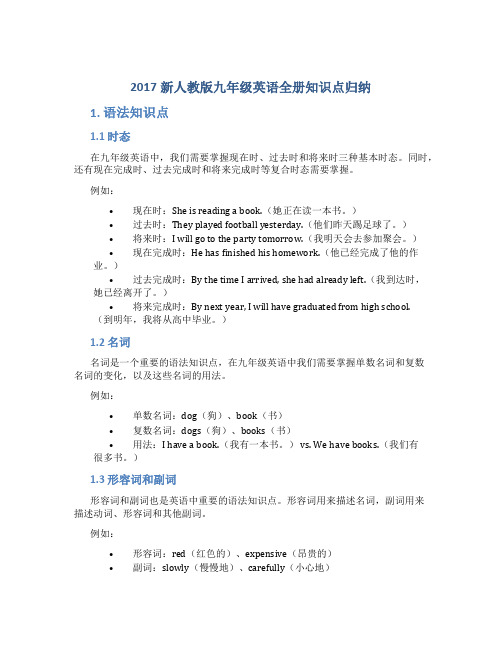
2017新人教版九年级英语全册知识点归纳1. 语法知识点1.1 时态在九年级英语中,我们需要掌握现在时、过去时和将来时三种基本时态。
同时,还有现在完成时、过去完成时和将来完成时等复合时态需要掌握。
例如:•现在时:She is reading a book.(她正在读一本书。
)•过去时:They played football yesterday.(他们昨天踢足球了。
)•将来时:I will go to the party tomorrow.(我明天会去参加聚会。
)•现在完成时:He has finished his homework.(他已经完成了他的作业。
)•过去完成时:By the time I arrived, she had already left.(我到达时,她已经离开了。
)•将来完成时:By next year, I will have graduated from high school.(到明年,我将从高中毕业。
)1.2 名词名词是一个重要的语法知识点,在九年级英语中我们需要掌握单数名词和复数名词的变化,以及这些名词的用法。
例如:•单数名词:dog(狗)、book(书)•复数名词:dogs(狗)、books(书)•用法:I have a book.(我有一本书。
) vs. We have books.(我们有很多书。
)1.3 形容词和副词形容词和副词也是英语中重要的语法知识点。
形容词用来描述名词,副词用来描述动词、形容词和其他副词。
例如:•形容词:red(红色的)、expensive(昂贵的)•副词:slowly(慢慢地)、carefully(小心地)•用法:He is a tall boy.(他是一个高个子男孩。
) vs. He talks slowly.(他说话慢慢地。
)2. 听力技巧在九年级英语中,我们还需要掌握一些听力技巧,以便更好地理解和记忆英语听力材料。
2.1 做好听前准备在听英语听力材料前,我们需要:•根据题目预测听力内容的主题和要点•了解所听的材料背景和语境•清楚了解所需填写的信息和要求2.2 注意听力技巧在听英语听力材料时,我们需要:•仔细听讲,积极捕捉每一个关键信息•找准关键词,比如人名、地名、数字和时间等•注意语音语调,理解潜在的含义和意图3. 阅读技巧除了听力技巧,九年级英语还需要掌握一些阅读技巧,以便更好地理解和记忆阅读材料。
- 1、下载文档前请自行甄别文档内容的完整性,平台不提供额外的编辑、内容补充、找答案等附加服务。
- 2、"仅部分预览"的文档,不可在线预览部分如存在完整性等问题,可反馈申请退款(可完整预览的文档不适用该条件!)。
- 3、如文档侵犯您的权益,请联系客服反馈,我们会尽快为您处理(人工客服工作时间:9:00-18:30)。
九年级英语知识点归纳总结Unit1 《How can we become good learners? 》知识点【短语归纳】1. have conversation with sb. 同某人谈话2. too…to…太 .... 而不能3. the secret to ...........的秘诀4. be afraid of doing sth./ be afraid to do sth. 害怕做某事5. look up 查阅6. repeat out loud 大声跟读7. make mistakes in 在… …方面犯错误8. connect ......... w ith…把 .... 和.... 连接/联系起来9. get bored 感到厌烦10. be stressed out 焦虑不安的11. pay attention to 注意;关注12. depend on 取决于;依靠13. the ability to do sth.. 做某事的能力【单元知识点】1. by + doing :通过.... 方式(by是介词,后面要跟动名词,也就是动词的ing 形式)2. talk about 谈论,议论,讨论The stude nts ofte n talk about movie after class 学生们常常在课后讨论电影。
talk to sb= talk with sb 与某人说话3. 提建议的句子:①What/ how about +doing sth.? 做…怎么样?(about后面要用动词的ing 形式,这一点考试考的比较多)女口:What/ How about going shopping?②Why don't you + do sth.? 你为什么不做…?(注意加黑的部分用的是动词的原型)女口:Why don't you go shopping?③Why not + do sth. ? 为什么不做…?(注意加黑的部分用的是动词的原型)女口:Why not go shopping?④Let's + do sth. 让我们做…吧。
(注意加黑的部分用的是动词的原型)如:Let's go shopping⑤Shall we/ I + do sth.? 我们/我…好吗?女口:Shall we/ I go shopping?4. a lot许多,常用于句末。
女如:I eat a lot.我吃了许多。
5. too…tc太…而不能常用的句型:too+形容词/副词+ to do sth.女口:rm too tired to say anything.我太累了,什么都不想说。
6. aloud, loud与loudly的用法,三个词都与大声”或响亮”有关。
①aloud是副词,通常放在动词之后。
② loud可作形容词或副词。
用作副词时,常与speak, talk, laugh等动词连用,多用于比较级,须放在动词之后。
女口:She told us to speak a little louder.她让我们说大声一点。
③ loudly是副词,与loud同义,有时两者可替换使用,可位于动词之前或之后。
女口:He does not talk loudly or laugh loudly in public.他不当众大声谈笑。
7. not …at a一点也不,根本不女如:I like milk very much,l don't like coffee at all.我非常喜欢牛奶,我一点也不喜欢咖啡。
not经常可以和助动词结合在一起,at all则放在句尾8. be / get excited about sth. 对…感兴奋9. ① end up doing sth : 终止做某事,结束做某事女口:The party ended up singing.晚会以唱歌而结束。
② end up with sth.以…结束(注意介词with)如:The party ended up with her singing. 晚会以她的歌唱而告终。
10. first of all 首先(这个短语可用在作文中,使得文章有层次)11. also 也、而且(用于肯定句)常在句子的中间either 也(用于否定句)常在句末too 也(用于肯定句)常在句末(它们三个的区分要清楚,尤其要知道用在什么句子中以及各自的位置)12. make mistakes 犯错女口:I often make mistakes.我经常犯错。
make a mistake 犯一个错误女口:I have made a mistake .我已经犯了一个错误。
13. laugh at sb. 笑话;取笑(某人)(常见短语)女口:Do n't laugh at me!不要取笑我!14. take notes 做笔记,做记录15. enjoy doing sth .喜欢做… 乐意做…(我不得不说,这是一个非常重要的考点…)如:She enjoys playing football. 她喜欢踢足球。
enjoy oneself 过得愉快如:He enjoyed himself. 他过得愉快。
16. native speaker 说本族语的人17. make up 组成、构成18. one of + (the+形容词最高级)+名词复数形式:…其中之一(这一题主要考两点,一是最高级,一是名词复数,大家做题的时候要小心)女口:She is one of the most popular teachers 她是最受欢迎的教师之一。
19. It's + 形容词+ (for sb. )to do sth :(对于某人来说)做某事…女口:It's difficult (for me )to study English.对于我来说学习英语太难了。
句中的it 是形式主语,真正的主语是to study English20. practice doing练习做某事女口:(practice后面接动名词,这一点有可能考到)She ofte n practice speak ing En glish.她经常练习说英语。
21. decide to do sth.决定做某事(重要考点,大家需要记住decide后面跟的是不定时,也就是to do)如:LiLei has decided to go to BeiJing . 李雷已经决定去北京。
22. unless 假如不,除非:引导条件状语从句如:You will fail uni ess you work hard .假如你不努力你会失败。
23. deal with 处理女如:I dealt with a lot of problem.24. worry about sb./ sth. 担心某人/ 某事如:Mother worried about his son just now.妈妈刚才担心他的儿子。
25. be angry with sb. 对某人生气26. perhaps = maybe 也许27. go by (时间)过去. 如:Two years went by. 两年过去了。
28. see sb / sth doing 看见某人正在做某事(如果是看到正在做什么,要用动词ing形式,考的较多的也是动词ing形式)see sb / sth do看见某人在做某事如:She saw him drawing a picture in the classroom. 她看见他正在教室里画画。
29. each other 彼此30. regard…as •把:••看作为…女口:The boys regarded Anna as a fool.这些男孩把安娜看成傻瓜。
31. too many许多,修饰可数名词女口:too many girlstoo much :许多,修饰不可数名词女口:too much milk (要区分too many和too much只要记住他们修饰什么词就可以了)much too :太,修饰形容词女口:much too beautiful (too much 和much too意思不同,大家不要混淆它们的意思,这种单词容易出解析题)32. change…into •将…变为…33. with the help of sb. == with one's help 在某人的帮助下(注意介词of 和with ,容易出题)如:with the help of LiLei == with LiLei's help 在李雷的帮助下34. compare …to ••把…与…相比(另外,大家要注意另一个短语,compare with ,这也是一个重要的短语,意思是:拿…和…比较)35. i nstead代替用在句末,副词(我曾经遇到过in stead放在句尾的题目,大家要关注一下这个考点)in stead of sth / doi ng sth代替,而不是(这个地方考的较多的就是in stead of doing sth,也是就说如果of后面跟动词,要用动名词形式,也就是动词的ing形式)女口:I will go instead of you.我将代替你去。
Unit2 《I think that moon cakes are delicious! 》知识点【短语归纳】1. the Lantern Festival 元宵节2. the Dragon Boat Festival 端午节3. the Water Festival 泼水节4. be fun to watch 看着很有意思5. eat five meals a day 一天吃五餐6. put on five pounds 体重增加了五磅7. in two weeks 两星期之后8. be similar to... 与..... 相似17. end up最终成为;最后处于18. share sth. with sb.与... 分享....19. as a resul结果20. one,. . the other...(两者中的)一个……另一个……21. take sb. out for dinner 带某人出去吃饭22. dress up 乔装打扮23. haun ted house 鬼屋31. call out 大声呼喊32. remind sb. of 使某人想起33. sound like 听起来像34. treat sb. with. 用/以……对待某人35. the beginning of new life 新生命的开始【重点句子】1.1 thi nk that they ' re fun to W我认为它们看着很有意思。
